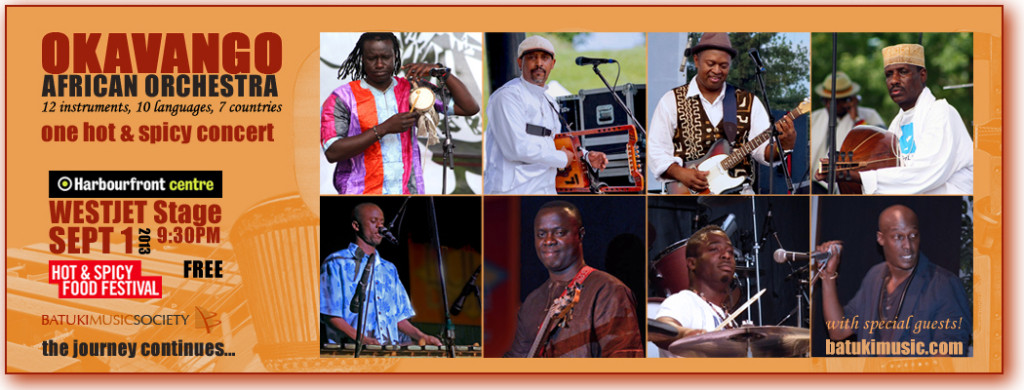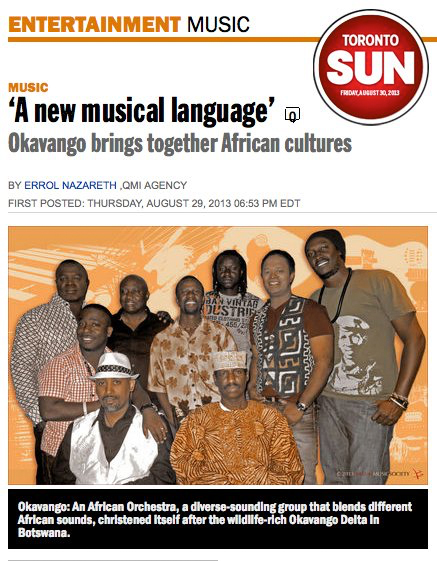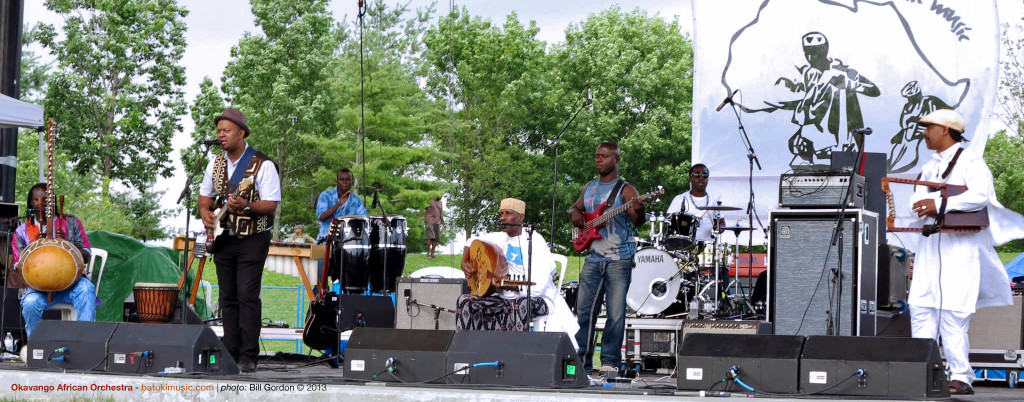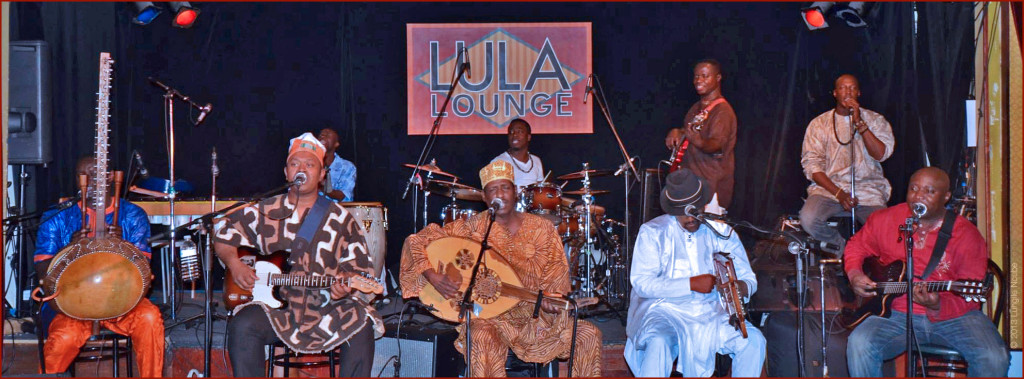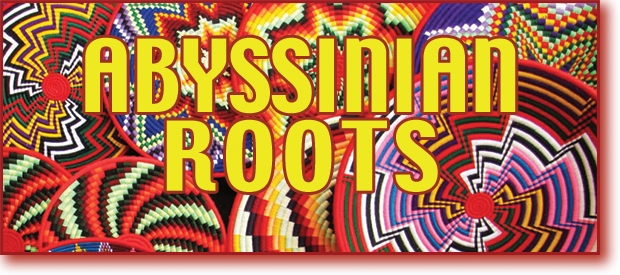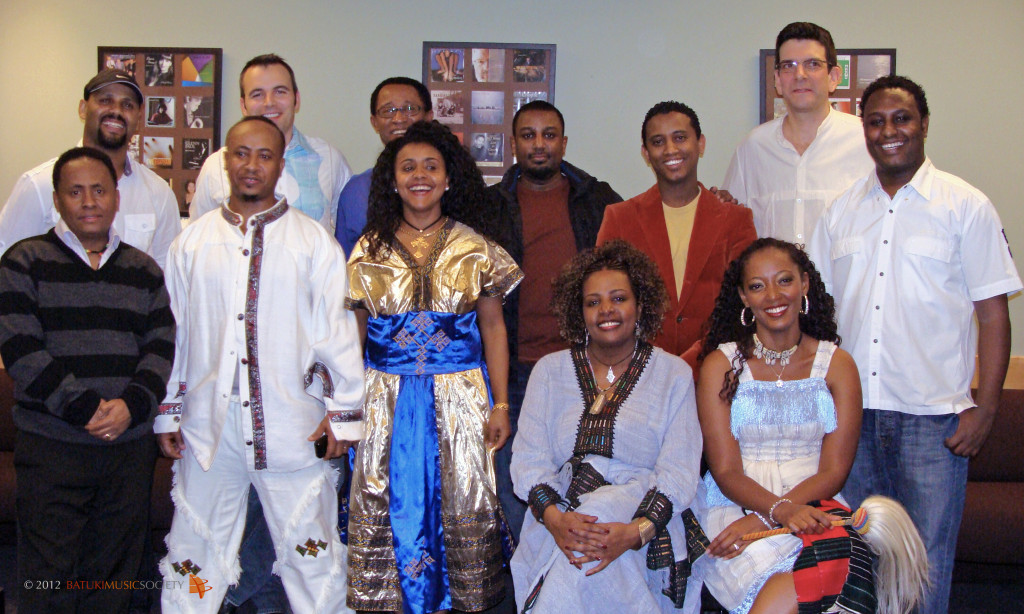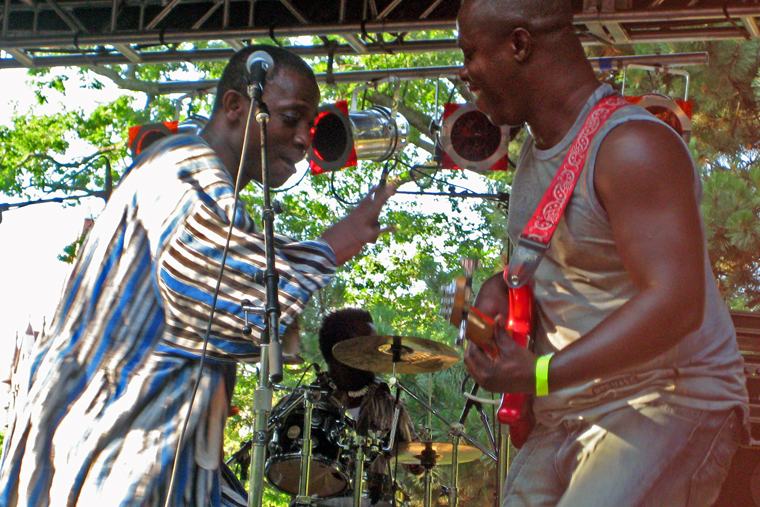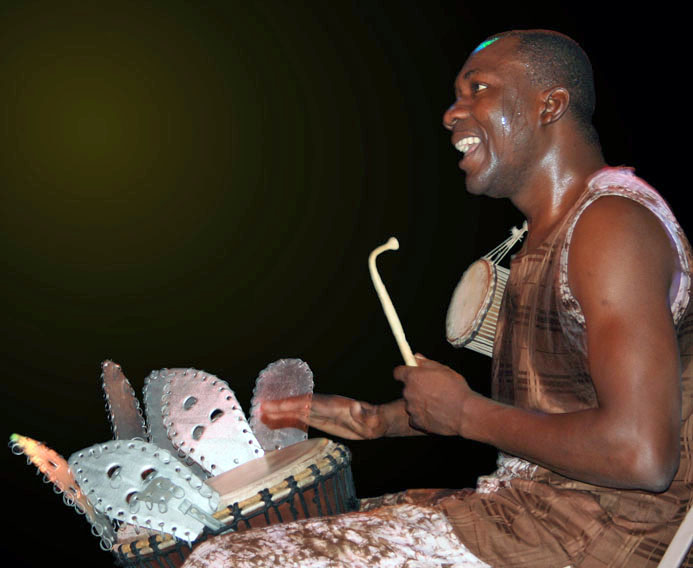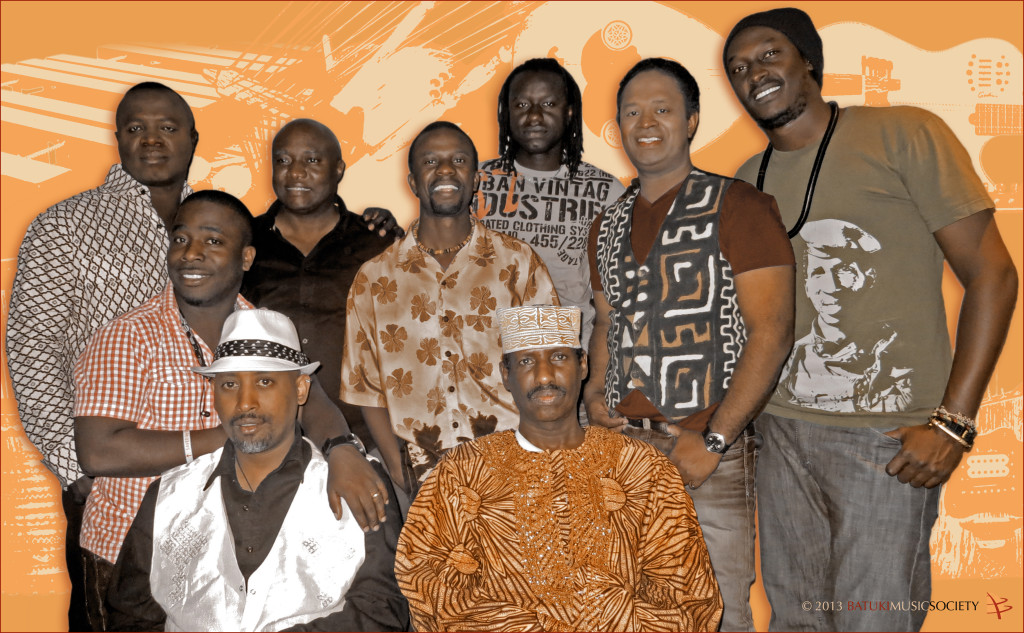
l-r: Ebenezer Agyekum, Kofi Ackah, Aron Nitunga, Tich Maredza, Sadio Sissokho, Donné Roberts, Nicolas Simbananiye
seated: Daniel Nebiat, Nuudi Kooshin
Batuki Music Society presents
OKAVANGO AFRICAN ORCHESTRA
12 instruments, 10 languages, 7 countries…
The orchestra takes its name from the Okavango Delta, a basin in the Kalahari Desert in Botswana, where many different animal species come together to feed and find water. Predators and prey are forced to coexist and share the meager resources because of the harsh environment around them.
Similarly, Okavango African Orchestra brings together the traditional music and instruments of several major African cultures that historically have had little or no interaction. The musicians of Okavango have created a common meeting place for these disparate cultures, and a new musical language that harmonizes their different tuning systems, rhythms, and timbres. The multicultural spirit of modern-day Canada bridges ancient African solitudes.
the journey continues…
one debut album preview concert
the return of OKAVANGO AFRICAN ORCHESTRA
Over the autumn and winter of 2012, the reassembled Okavango African Orchestra revisited the site of its triumphant debut, the Canadian Broadcasting Centre where it conquered a full-house at Glenn Gould Studio in February 2011. Its members, returning and new, hunkered down in Studio 211 for the recording of the group’s debut album, due for release in early 2014.
Two years now since its last appearance, Batuki Music Society brings back the Okavango African Orchestra for its continuing journey to an “Africa without borders… before the borders were created”.
The current members of OKAVANGO AFRICAN ORCHESTRA:
Aron Nitunga – Burundi/guitar; Daniel Nebiat – Eritrea/krar, Kooshin – Somalia/kaban; Donné Roberts – Madagascar/guitar; Sadio Sissokho – Senegal/kora & percussion; Tichaona Maredza – Zimbabwe/marimba & nunga-nunga;
Kofi Ackah – Ghana/drums & percussion; Ebenezer Agyekum – Ghana/bass; Nicolas Simbananiye – Burundi/vocals.
SEPTEMBER 1, 2013 at Harbourfront Centre
feature by Errol Nazareth in the Toronto Sun on Friday, August 30. (click on image to read)
JULY 7, 2013 – AFROFEST Toronto
photo: Bill Gordon (click on image to enlarge)
‘field recording’ of “Yohanna” by Daniel Nebiat – source: Mechanical Forest Sound
JUNE 6, 2013 – LULA LOUNGE Toronto
photo: Lungile Ncube (click on image to enlarge)
Karibuni radio program, CIUT 89.5FM Toronto – June 2, 2013:
host Nadine McNulty talks about the Okavango African Orchestra with a new member, guest Tich Maredza.
Here and Now: CBC Radio One 99.1 FM Toronto – June 3, 2013:
Song of the Week: Okavango African Orchestra, “Na”
guest Nadine McNulty introduces the song and the ensemble.
where it all began: Glenn Gould Studio, February 2011
want to read more? please click on the above links (in orange & underlined).
Batuki Music Society gratefully acknowledges the support of Canadian Heritage and the Ontario Arts Council
Assembled by the Batuki Music Society, this unique ensemble, featuring some of the hottest expatriates coming out of Addis Ababa’s nightclub and culture scene, paints a vibrant portrait of Ethiopian musical forms: the monochord music of the ‘Azmaris;’ the pentatonic and varied regional sounds; and the hybrid Ethio-jazz.
The ensemble at the ‘Ethiopia: A Musical Perspective’ concert: Glenn Gould Studio, Toronto on February 11, 2012
(front: L to R) Fantahun Shewankochew: krar, vocals; Abebe Fikade: masenko, vocals; Eyerusalem Dubale: vocals; Martha Ashagari: vocals; Saba Alemayehu: dance
(back: L to R) Dawit Tesfamariam: keyboards; John MacLean: tenor saxophone; Girma Woldemichael: tenor saxophone; Bereket Gebremedn: keyboards; Henok Abebe: vocals; Daniel Barnes: drums; Yared Zeleke: bass
not pictured – Andargachew Abebe: guitar (‘Andy’ in Ethiopia at time of this concert, now replaces Bereket, who had ably substituted as second keyboardist.)
Ethiopia has the enviable position in the African continent of being the only country that was never colonized by European powers. It also had the longest continuous monarchy until the overthrow of Emperor Haile Selassie in the ‘70s by the military. Ethiopia has a glorious past with a great civilization, one of a few countries with a written language (the Ge’ez script) and a developed system of governance. The resilience and bravery of the Ethiopian people in resisting Italian campaigns to colonize it are often seen by many Africans as a catalyst that sowed the seeds of independence for their countries. The idea of a United Africa started in Ethiopia; hence, Africa’s first parliament was established in Addis Ababa, the capital city.
Toronto has one of the largest Ethiopian populations in Canada; there is already a large pool of talent within this community.Having interacted on many occasions with its leaders and artists. Batuki Music Society’s Artistic Director proposed the idea to put together a musical collective to showcase the various traditions and cultures of Ethiopia.
There will be an array of traditional and modern instruments displaying on a single stage for the first time in Canada the wealth of talent and energy from “the Horn of Plenty”.. Batuki Music Society is offering fresh eyes at defining what Ethiopian music is.
listen to songs and an interview with series curator Francis Falceto | NPR 2006:
Jazz from the Horn of Africa: ‘Ethiopiques’
Afrafranto (Ghana)
Bio
Afrafranto (‘Butterfly’ in the Akan language of Ghana, West Africa) performs authentic acoustic palm wine and highlife music. The only group outside Ghana preserving and promoting this unique genre, Afrafranto has grown into a dynamic group that has entertained audiences over the past few years with their dance-driven music and electric performances.
Palm wine music is a West Africa music genre that evolved among the Kru people from Sierra Leone and Liberia. Portuguese guitars were introduced by sailors to these regions and the locals combined their melodies with Trinidadian calypso and created palm wine music. Palm wine music was named after the drink from the naturally fermented sap of the oil palm, which was shared at gatherings where African guitarists played. A style of acoustic guitar music that accompanies songs reflecting philosophies and stories of life, palm wine music was the forerunner of highlife music.
Afrafranto features four members of the JUNO award winning African Guitar Summit group – Theo Yaw Boakye on lead vocals and shakers, Pa Joe on guitar and vocals, Kofi Ackah on percussion and vocals, and Ebenezer Agyekum on bass guitar – along with Sam Donkor on balafon, and Marshall Nketiah on congas.
Music columnist Errol Nazareth introduces us to Afrafranto, a Toronto-based group specializing in “palm wine music”. It’s a style of acoustic guitar music that was born in West African countries like Ghana and Sierra Leone. Palm wine music got its name from a local drink made from the fermented sap of the oil palm tree, and musicians would gather at a booze can, under a tree or at someone’s home and play this music while folks drank the beverage.
(original broadcast: CBC One Toronto 99.1FM Metro Morning – August 2, 2012)
A benefit concert, Highlife Help: Flood Relief for BAPMAF (the Bokoor African Popular Music Archives Foundation), featuring Afrafranto – December 11, 2011 @ Lula Lounge
Amadou Kiénou (Burkina Faso)
Bio
Born in Ouagadougou in Burkina Faso, Amadou Kiénou is the seventh son of a family of praise singers from Dafing, originating from a tribe descended from the ancient Mandingue Empire. Trained from his youth to be a griot, through the rituals and ceremonies that still mark the life of his native village (baptisms, weddings, funerals, sacred rites etc), as a professional he has worked with such artists as Manu Dibango, Youssou N’Dour and Baaba Maal, and has performed concerts in Africa, Europe, South America and North America. Amadou uses a new and unique way of conceiving music and performing it in a spectacular way. Due to the deep experience the Kiénous have from their musical backgrounds, Amadou is able to draw upon this and demonstrate it during his live shows. During his solo concerts, Amadou expresses his mastery of the djembe and plays it with talent and ease, endlessly offering new and rich sounds in an astonishing and creative way. Like no one else, he can play both the djembe and the tama simultaneously, a technique that is a marvel to watch.
